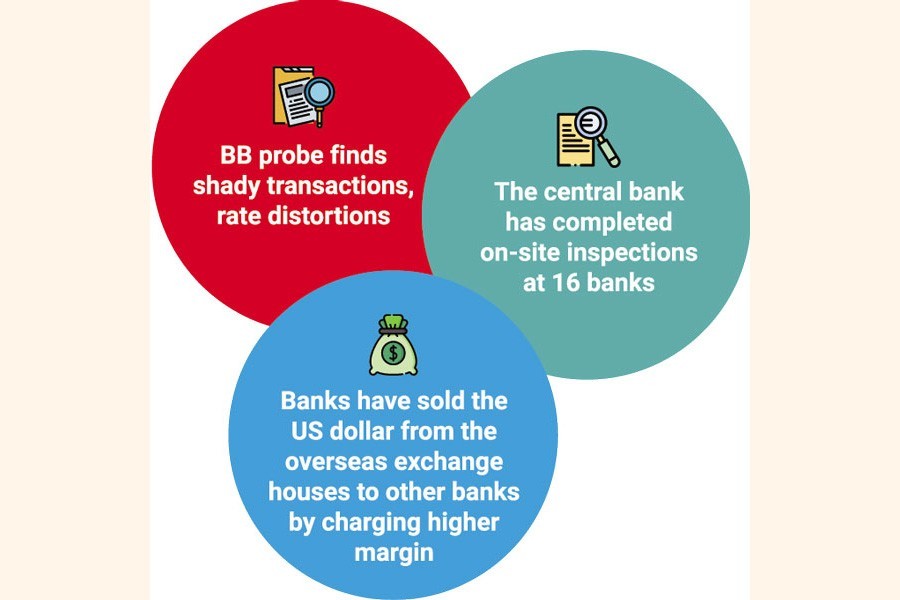Devious deals by banks trigger current forex volatility in Bangladesh, a probe finds and the central bank begins quizzing them over the anomalies, officials say.
The Bangladesh Bank is seeking clarification from the suspect banks particularly on conceal of information on foreign-exchange (forex) deals by bending the rules.
Such information concealment on forex transactions is mainly responsible for recent volatility on the money market, according to initial findings by the BB probe teams.
The central bank has sought clarification about different types of anomalies relating to the forex transactions from two banks on the basis of such findings.
The top executives of the banks -- one a state-owned commercial bank (SoCB) and another is a private commercial bank (PCB) -- have been asked to submit their explanations against such allegations by June 06.
"We'll take next course of action against the banks after receiving their explanations," a senior BB official told the FE Wednesday, without elaborating.
The central bank has already completed similar on-site inspections into 16 banks, including four state-owned commercial banks (SoCBs), to find out alleged 'distortion' on foreign-exchange rate by the banks concerned.
Rate distortion means banks charge higher price of the US currency bypassing their announced rates particularly for BC (bills for collection) selling and TT (Telegraphic Transfer) clean.
Besides, the central bank is now probing alleged unusual movements of the US dollar from two more leading private commercial banks.
"We'll seek clarification about anomalies relating to the foreign- exchange transactions from all the banks phase by phase," another BB official said while replying to a query.
During the inspections, the teams found that the banks did not show their foreign exchange deposited with overseas accounts, officially known as NOSTRO account, in their net open position (NOP) properly.
A NOSTRO account is an account that a local bank maintains with an overseas bank in the foreign currency.
On the other hand, NOP means the net sum of all foreign-currency assets and liabilities of a financial institution, inclusive of all of its spot and forward transactions and off-balance sheet items in that foreign currency.
"It's a concealment of information on foreign exchange," a probe team member told the FE, adding that it is also a punishable offence under the existing Bank Company Act.
Besides, the banks have sold the US dollar purchased from the overseas exchange houses engaged in remitting money to other banks by charging higher margin that distorted the market, according to the officials.
They also said the banks had also quoted higher rates for forward deals bypassing international practices.
The teams have been assigned to check the allegation of quoting higher rates to the overseas exchange houses engaged in remitting money alongside encashment of export proceeds of other banks' clients in a hunt for the dollar amid a worldwide crunch that leads to sociopolitical turmoil in some countries.
Market operators, however, say a good number of the banks had purchased value-added portion of the export proceeds from other banks' clients with alluring offer of higher rates leapfrogging the existing regulations.
They also indentified two major causes -- offering higher rates to the overseas exchange houses engaged in remitting money alongside encashment of export proceeds of other banks' clients -- which were mainly responsible for creating volatility on the country's forex market in recent months.
Meanwhile, the central bank ramped up its foreign-currency liquidity support in a bigger way to scheduled banks for taming volatility on the country's forex market. The BB sold US$130 million directly to three state-owned commercial banks only on Wednesday to meet the growing demand for the greenback.
A total of nine banks including private commercial banks (PCBs) received such liquidity support worth $123 million from the central bank on Tuesday on the same grounds.
"We've provided the US currency to the SoCBs for settling import- payment obligations particularly for LNG (liquefied natural gas), fuel oils and fertilizers," a BB senior told the FE.
He also said the central bank had already strengthened its foreign- currency liquidity support to the banks for reducing mismatch between inflow and outflow of the foreign exchange.
The central bank has so far sold $6.08 billion from the reserves directly to the commercial banks as liquidity support for settling their import-payment obligations in the current fiscal year (FY), 2021-22.
The BB may continue such foreign-currency feeding to the banks in line with the market requirement, according to the central banker.
Talking to the FE, a senior treasury official at a leading commercial bank said the central bank should provide such liquidity support to settle private imports alongside government ones for bringing stability in the market.
The treasury official also urged the central bank to take effective measures to create a health environment through revamping trading on the inter-bank market.
Majority banks quoted their announced exchange rates on the day for customers -- both exporters and importers, according to the treasury official.
The US dollar was quoted at maximum of Tk 89.15 each for the sale of bills for collection, generally known as BC, on Wednesday -- unchanged from the previous level.
On the other hand, the US currency was quoted at Tk 88.15 on the day, unchanged from the previous level, for telegraphic transfer (TT) clean, which is applicable to commercial remitters.
The Bangladesh Taka (BDT) is maintaining a depreciating mode against the US currency mainly due to higher outflow of foreign exchange following 'hefty growth' in import payments compared to the inflow in the last few months.
The mismatch has resulted in widening current-account deficit in a macroeconomic imbalance that prompts the government to adopt some thrift measures and putting baits on offer for netting foreign exchange to secure depleting forex reserves.


